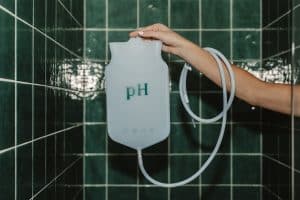With so many massage options out there, how do you know which one is right for you? What’s the difference between a deep tissue massage and a sports massage? What’s a remedial massage? And which one would you benefit from? We’re here to help debunk some of the myths around massage so you can make an educated decision about what treatment is best for you. And if you’re still in any doubt, chat to one of our highly-qualified therapists who’ll be able to advise you about what massage is best suited for your needs.
What is a sports massage?
Sports massage is a targeted therapy aimed at treating the muscles and joints used for a specific activity and focuses on areas of the body which are heavily worked or put under repetitive strain as part of a sports or training regime. Understanding the body, the actions of the muscles and effects from them being out of balance are crucial to providing an effective sports massage treatment.
Who should get a sports massage?
Sports massage therapy is tailored specifically towards athletes – from elite professionals to weekend surfers. If you regularly put your body under strain from activity, experience muscles soreness from training, have a sports related injury or just want to look at an addition to your regular fitness or training regime to support performance then a sports massage is probably right for you.
A sports massage can vary greatly depending on where you are in your training schedule. For example, you wouldn’t want extremely deep work right before an event as it could affect peak muscle performance. Following a period of intense activity such as after an event, a light flush of the tissues may be most effective to aid in recovery. If you’re suffering from injury, a more targeted treatment may be in order. Working regularly with a therapist and discussing your routine will ensure they get to know you and your body so you get the most out of every treatment.
What are the benefits of a sports massage?
Here are some of the key benefits of a sports massage:
- Supports the body pre- and post-event to maximise performance and aid in recovery time during training or after an event;
- Can help improve muscle flexibility and joint mobility improving overall range of motion;
- Improves circulation and lymphatic drainage which flushes out toxins and can aid in recovery time;
- Is a useful component as part of a balanced training regime. Regular massage, as part of your overall fitness program, can help support injury avoidance and management.
I’m in pain but not an athlete. Can I still get a sports massage?
Depending on what’s causing your pain will depend upon the best form of treatment for you. You’ll more likely need a remedial massage, which is a treatment geared toward assessing the cause of pain and creating a tailored massage plan targeted specifically to the problem areas. This could involve a variety of techniques including deep tissue work, trigger point therapy, myofascial release, joint mobilisation and stretching. The therapist will assess before and after the treatment to review effectiveness as well as recommending an ongoing plan and homecare to support your rehabilitation. Remedial massage is great for musculoskeletal issues, neck or back pain, headaches, postural imbalances, injuries and it supports the body’s own healing process.
I like a really strong massage. Should I book in for a sports massage?
Depending on your condition or issue it may not be a sports massage you need. A thorough assessment prior to the treatment will help establish the best approach. As we just discussed, it’s more likely you’ll need a remedial massage treatment. Here the therapist can apply deep tissue massage techniques for firmer pressure. If you like a strong massage, just let the therapist know and they can be sure to approach your treatment with this in mind. You’ll feel as though you’ve had a great treatment as well as being treated in the most effective way.
What’s a deep tissue massage?
Deep tissue massage is simply a remedial massage technique which uses firm pressure and strokes to work on the deeper layers of muscles and connective tissue. It’s often used with various other techniques as part of a remedial or sports massage treatment. Due to the depth of the work involved during the treatment you may feel sore for a few days following a treatment involving deep tissue work.
“You know what they say, no pain no gain!”
Should you be in pain to really get the benefits of a massage? This is such a tricky question! Each person has a different pain threshold so the same massage on different people can feel completely different depending on overall wellness, tissue health, levels of activity or injuries. Certainly some techniques or points of a massage can be uncomfortable, but pain doesn’t necessarily equal effectiveness.
We always work within the individual’s limitations, working with and listening to the body to see how it responds to get the most effective release. This can involve a range of techniques including but not limited to deep tissue work, trigger point therapy, myofascial release, passive motion techniques, active muscle release, joint mobilisation and stretching.
If the pressure is too much it can cause the body can tense up, creating the opposite effect of what massage is aimed to do, which is to relax and soften the tissues. No pain doesn’t necessarily mean no gain. Some of the subtlest treatment can have the most profound effects so be open to experiencing something new and trust the approach of your therapist.
Communication is key (from both sides!). The therapist should explain what they are doing and why, but also if you are unsure of anything, feel free to speak up. We want you to get the most from your treatment.
What other treatments would be good for me if I’m sore after training?
If you’re suffering from muscles aches and joint pain following training then an infrared sauna session could help you. Infrared therapy helps to reduce inflammation in the body and support tissue regeneration by increasing circulation, removing toxins and relaxing your muscles. All helpful in the recovery process after training or competing in an event.
Magnesium can also be quite beneficial, as this magic mineral helps tight, aching muscles to loosen up and relax, allowing for a speedier recovery time for you. It can be taken as an oral supplement, or absorbed transdermally (through the skin) through specially formulated creams, oils and even bath salts. The dosage and type of supplementation that would suit you best depends on your activity level and other health aspects, so it’s always best to see your health practitioner for advice.
Lastly, ensuring your diet is low in processed/junk food and refined sugars and high in wholefoods that meet necessary macronutrient and micronutrient requirements will also help with both your performance and recovery. If you’re unsure about what your dietary intake should look like, a Nutritionist will be able to assist you.
AMT (Association of Massage Therapists) accreditation
Health fund rebates available
At pH Clinic we offer remedial message (which includes sports massage, deep tissue, trigger point and myofascial release), lymphatic drainage and relaxation massage. Our therapists are fully qualified and trained to the highest standards and each treatment is tailored to your individual needs. They will be able to recommend the best approach for you, plus offer support and aftercare following your treatment.
We offer massage Monday to Sunday, if you have any questions or need advice on which treatment is right for you, please call us on 0420 644 852. You can also book online.


